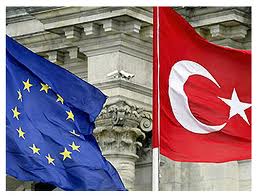Dan Bilefsky, NYT:
Turkey’s economy is projected to grow at a 7.5 per cent annual rate while Europe’s are sputtering.
As economic contagion tarnishes the European Union, a newly assertive Turkey is increasingly looking east instead of west, and asking a vexing question: Should Turkey reject Europe before Europe rejects Turkey? When Recep Tayyip Erdogan, the charismatic prime minister, first swept to power in 2002, he made Turkey’s entry into the EU his overriding goal. Determined to anchor the country to the West, Erdogan’s Muslim-inspired Justice and Development Party tackled thorny issues like improving minority rights and easing restrictions on free speech to move Turkey closer to Western norms.
But Turkey’s bid got anything but a warm reception from many members of the union, not least because of Turkey’s large, almost entirely Muslim population. The negotiations dragged on endlessly without ever yielding a clear pathway to membership.
Weilding nee clout
Now it is Turkey that has soured on the idea, analysts here say. With Europe roiled by a spiraling credit crisis and the tumult of the Arab Spring creating opportunities for Turkey to wield new clout as a regional power, people here are weighing a step that would have been unthinkable only a few years ago: walking away from the EU altogether.
“Prime Minister Erdogan wanted to be the first conservative Muslim leader who would bring Turkey to the West, but after Europe betrayed him, he abandoned those ambitions,” said Erol Yarar, the founder of a religiously conservative business group of 20,000 companies that is close to the prime minister. “Today, the EU has absolutely no influence over Turkey, and most Turks are asking themselves, ‘Why should we be part of such a mess?”’
Turkey’s increasingly muscular foreign policy in the Middle East was in evidence last week when it imposed tough sanctions on Syria and made preparations for possible military intervention. And Turkey has become a powerful voice of regional outrage over Israel’s treatment of the Palestinians, especially since it froze its ties with Israel over a deadly commando raid on a flotilla of vessels that tried to reach Gaza from Turkey.
Meanwhile, Turkish officials say relations with the EU have reached a state of hopeless disrepair, made worse by the prospect of Cyprus taking over the rotating presidency of the union next year.
Turkey has been locked in an intractable political fight with Cyprus since 1974, when it invaded the island to prevent a proposed union with Greece and set up a rival government in the ethnic Turkish part of Cyprus that only it recognizes. In London last month, President Abdullah Gul disparaged Cyprus as “half a country” that would lead a “miserable union,” Milliyet, a Turkish newspaper, reported. Then, when France took the unusual step last week of proposing that Turkey be invited to take part in a meeting of the union’s foreign ministers to discuss Syria, Cyprus vetoed the idea.
A century ago when the Ottoman Empire was crumbling, Turkey acquired the unwelcome nickname “the sick man of Europe.” Now many Turks cannot help but gloat that Turkey’s economy is projected to grow at a 7.5 per cent annual growth rate this year while Europe’s are sputtering.
Public opinion in Turkey has already turned away. According to surveys by the German Marshall Fund, 73 percent of Turks saw membership as a good thing in 2004, but only 38 percent felt that way by 2010.
The country’s minister for EU affairs, Egemen Bagis, said in an interview that Turkey remained committed to joining. With its young and dynamic work force, large domestic market and growing regional role, he said, Turkey would be a bigger asset than ever to the teetering union.
Cooler relations with Turkey are costing Europe influence in the Arab world, where Turkey, a NATO member bordered by Iran, Iraq and Syria, is fast becoming an important interlocutor for the West. For the first time in decades, analysts say, Europe needs Turkey more than Turkey needs Europe.
To the protesters in the streets of Cairo or Tripoli or Homs, Erdogan, a pious Muslim leading a prosperous country of 78 million, is a powerful symbol of the compatibility of democracy and Islam, while Europe’s perceived hostility to its Muslim residents undercuts its influence in the region.
Senior Turkish officials say Erdogan himself has turned away from Europe and embraced Washington instead, a development signaled by Turkey’s announcement of sanctions against Syria. While Erdogan coordinated closely on the issue with President Barack Obama, the officials said, Europe played only a supporting role.
via For Turkey, lure of EU is fast fading.


Leave a Reply